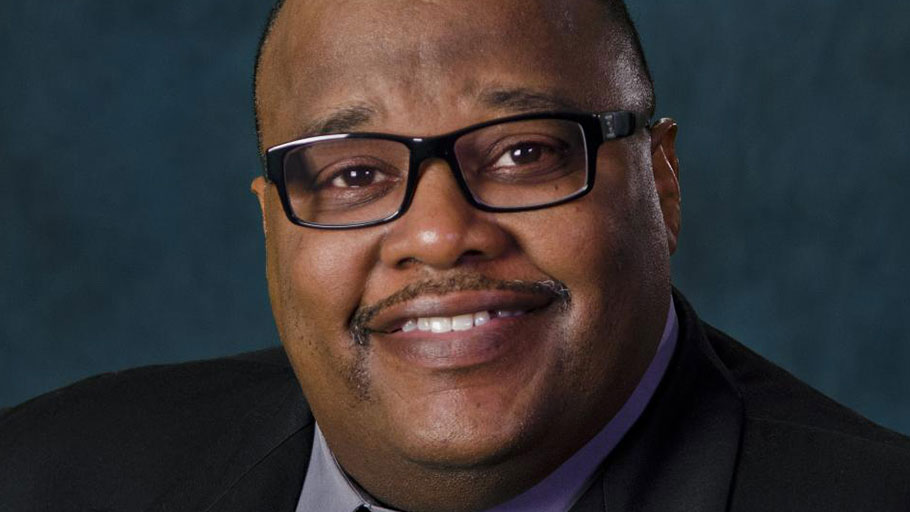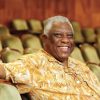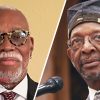The International Union, United Automobile, Aerospace and Agricultural Implement Workers of America (UAW) is one of the largest and most diverse unions in North America, with members in virtually every sector of the economy.
Representing nearly 1 million current and retired members of all ethnicities and backgrounds in the United States, Canada, and Mexico, the UAW has never had an African American president.
Until now.
“I was sitting at home and brainstorming on things that I needed to do, and then the phone started to ring,” stated Rory Gamble, a welder fixture repairman, who joined the UAW in 1974 when he worked at the Ford Motor Co. Dearborn (Mich.) Frame Plant.
“The local NAACP chapter president called, and others,” noted Gamble, who in December was named the 13th president of the 85-year-old union.
“It hit me then that, ‘Hey, you’re the first African American president,’” Gamble recalled. “It struck me like a rock. It’s a great accomplishment.”
Gamble observed a distinct and frequently-used quote that dates back to Winston Churchill: “With great power, comes great responsibility.”
“There is a great weight that comes with being the first African American president,” Gamble said.
“I want to be an example where no one can question my leadership and not use anything against another African American brother or sister to prevent them from being able to ascend to a position like this.”
Gamble accepted the job after his predecessor, Gary Jones, resigned amid a corruption scandal.
Despite the cloud of suspicion left behind, Gamble observed that the union must continue to move forward.
“Being an African American already means you have a great deal of responsibility and so I want to make sure that the way I carry myself will keep the doors open for others to follow,” Gamble expressed during an exclusive interview with NNPA Newswire.
“I’ve been blessed. I was able to come up during a time where there was a lot of activism. Unlike today, where a lot of our brothers and sisters get caught up in the digital world, I came up when everything was more hands-on and personal,” Gamble continued.
“You couldn’t hide behind a keyboard. You had to get up and see people and look them in the eye. Looking folks in the eye shows that you have a lot more of yourself invested.”
That doesn’t mean Gamble is technologically challenged.
“I had to get social media because you have to engage and keep up with the times,” he said.
“I’m very personal, and I love engaging with the members. I try hard to make sure that our union doesn’t get away from that even though we have this digital and electronic stuff. That’s fine, but the downside is that it can be icy when it comes to human relationships, so I like the eye-to-eye contact.”
Gamble, 64, started his UAW career as a welder fixture repairman.
Before that, he was a defensive tackle at Northwestern High School in Detroit, where he credited his father, a former elected officer of Local 600, as an early mentor.
In 1975, Local 600 members elected Gamble to serve as a plant trustee.
From 1976 to 1979, he was the local’s alternate benefit representative and, later, he served as a bargaining committee chair.
In 1988 Gamble earned an appointment as staff director and administrative assistant for Local 600’s president, with responsibilities for third-stage grievance agendas for all Ford Rouge plants and as editor of UAW Facts, the local’s newspaper, according to his biography.
He was elected delegate to the UAW’s 32nd Constitutional Convention and served on the Constitution Committee.
Since 1987 Gamble’s assignments have included local union health and safety coordinator, employee support services program, education director, civil rights coordinator, fitness center coordinator, and family services and learning center coordinator.
He has served as director of Local 600 Ford units, including Dearborn Engine and Fuel Tank, Dearborn Truck Plant, Milan, Industrial Athlete, and Dearborn Frame. Other assignments have included retirees’ liaison and coordinator of the Rouge Rehabilitation Center.
In 1998 and 2003, Gamble served on the UAW-Ford National Negotiating Team. From 1993 to 2002, he was elected for three terms as the local’s recording secretary.
Gamble was elected first vice president of Local 600 in 2002 and re-elected in 2005.
In 1999 Gamble received the Spirit of Detroit award; the 2006 Horace L. Sheffield Jr. Humanitarian Award; and the 2008 Minority Women’s Network (Detroit chapter) Man of the Year award.
“Labor unions have raised the standards of living, that’s pure and simple,” Gamble observed.
“If someone’s family gets into a major health scare, the family could be put into major financial jeopardy. So, the union has provided employees with job security, increased wages and enhanced health care benefits. You can plan for your kids to attend college and other important milestones that you might not otherwise be able to do if you didn’t have that protected status that unions provide.”
Gamble continued:
“I have never sat across the table from a CEO of any major company who didn’t have a contract with that company that guarantees their wages and benefits and even a golden parachute. That same worker will tell the worker in the plant on the floor that they don’t need a union, but every major CEO has his wages and benefits contracted. That’s a big irony.”
Gamble also noted the UAW’s relationship with the Black Press of America had spanned decades because the union and publishers share a common belief in social justice and civil rights.
“People need to know how important the Black Press is and how important the union is,” Gamble said. “Both have accomplished so much together. We do this by making sure that we use all of the available resources to educate our people and let them know how important and relevant the Black Press and the union is especially when they are functioning together. The things we’ve accomplished to uplift society and our people, in general, is something we need to continue to do together.”
This article was originally published by the National Newspaper Publishers Association.















